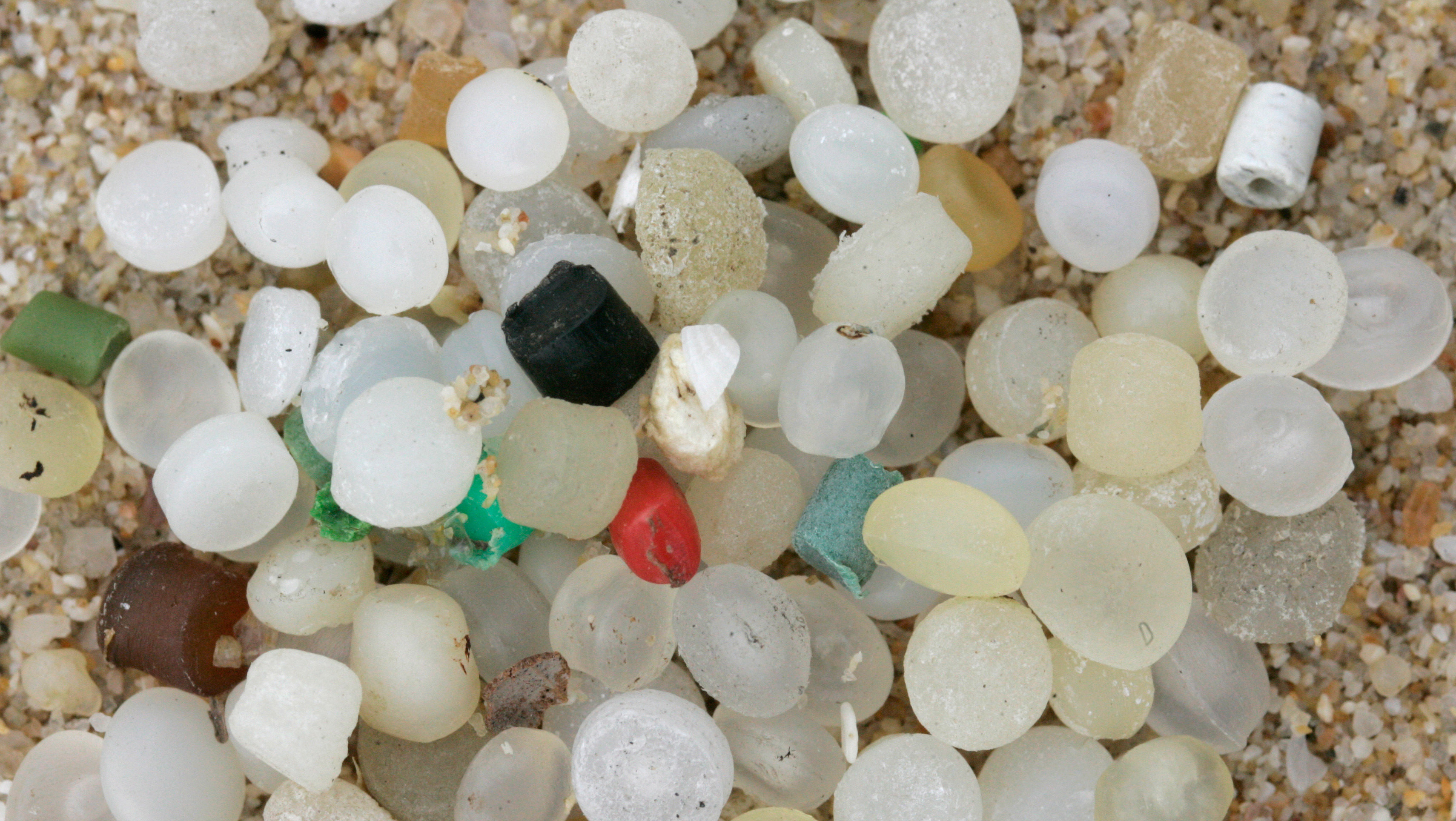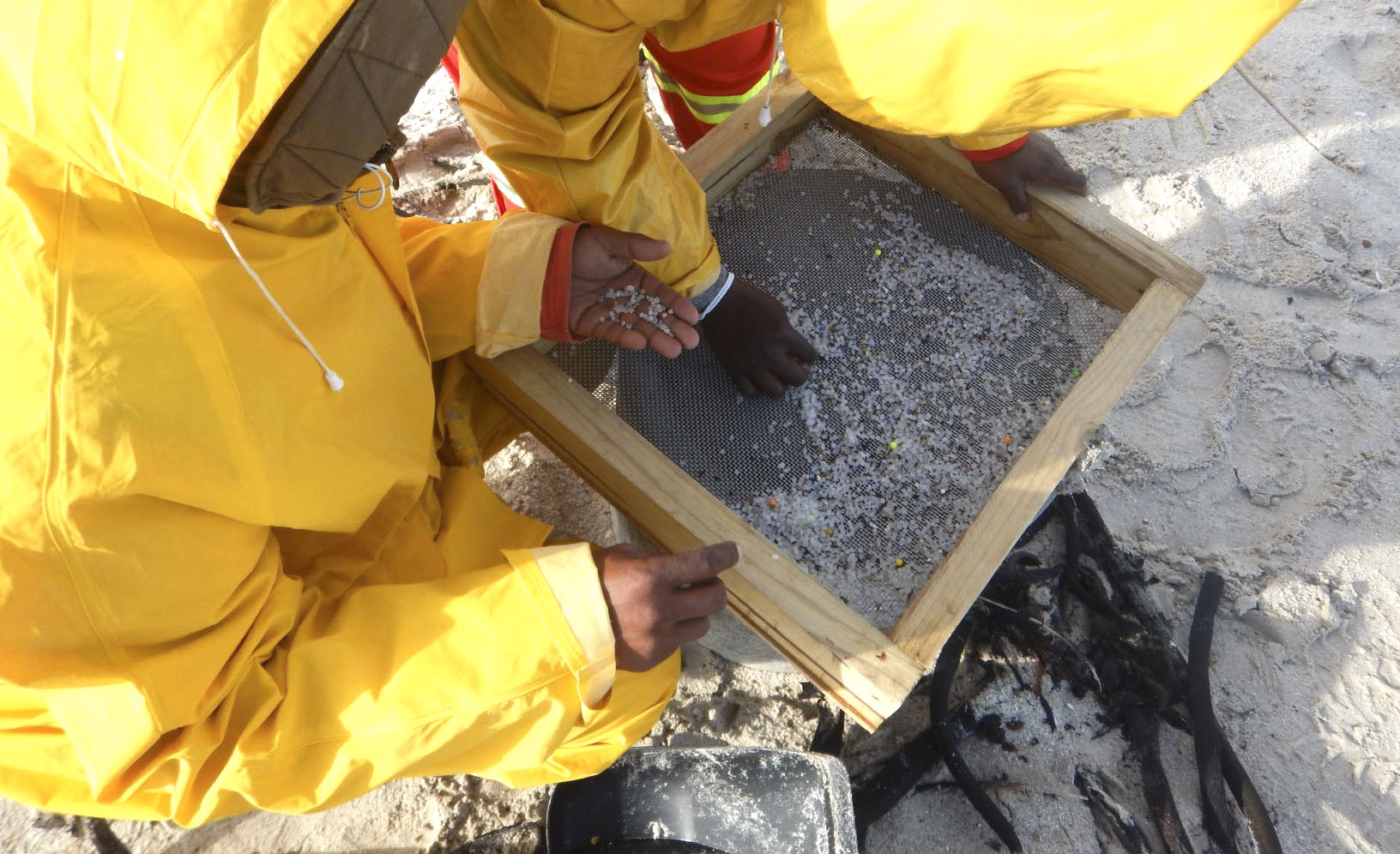On a beach walk in a nature reserve recently we encountered a “mining” crew with square sieves, reminiscent of the gold prospectors of the old American West.
The crew of 20 people cleared approximately 15kg of nurdles between Hermanus and Gansbaai daily. Where finding gold is a rush, the implication of finding millions of “mermaid tears” on a beach is like staring down the barrel of a gun.
A recent study estimates that global plastic production has increased a hundred-fold over the last 70 years to 200 million tonnes annually. Nurdles are lentil-sized plastic pellets that become the building blocks of everyday plastic products. As an indication, it takes around 650 nurdles to produce a 500ml single-use water bottle, or a toothbrush. A bottle cap will require 100 nurdles, and a standard plastic shopping bag is made from 175 of these pellets.
 Production plastic pellets, or 'nurdles'. (Photo: EPA/Alex Hofford)
Production plastic pellets, or 'nurdles'. (Photo: EPA/Alex Hofford)
Nurdles are transported globally to plastic manufacturing sites as a by-product of fossil fuel extraction. En route, they leak from trucks, railroad carriages and shipping containers and pollute water bodies, estuaries, and shores.
Turning up on a beach for the first time in the 1970s, plastic nuggets have been found on every continent since, except for Antarctica. An estimated 230,000 tonnes of nurdles end up in the ocean each year, equating to 23 billion plastic beads a day. Spilt pellets break down over a 500 to 1,000-year period, with chemicals used in its production slowly polluting the food chain.
Nurdles also assimilate the smells of their environment, resulting in marine animals often mistaking them for fish eggs, causing malnutrition, poisoning and blocked digestive systems. Fish eat nurdles, humans eat fish. Microplastics were found in human organs and in babies in 2020, and detected in human blood for the first time last year.
Policy interventions
Nurdle pollution is a complex, global problem. Currently, the plastics industry is mostly self-regulated. After a spill of around 1,700 tonnes in May 2021, Sri Lanka has asked for nurdles to be proclaimed a hazardous material. Should the International Maritime Organization (a UN agency) implement it accordingly, it could go a long way towards stricter regulations for the packaging and transportation of these pellets.
Policy interventions could be effective. A 2023 study measuring the estimated global count of floating plastics over time recorded a dip prior to 2006 that was attributed to stricter regulations coming into play. Post this period an upward trend is seen, indicative of the growth in global plastic production.
Public interventions
Non-profit organisations have initiatives and competitions in place to help clean nurdles from beaches and rivers. South Africa does a good job by global standards, and after a spill of 50 tonnes in Durban in 2017, about 70% of the beads have been reclaimed over a two-year period. It is deemed impossible to reclaim everything. Pellets from this spill were traced to Western Australian beaches over a year later, proving how fast and wide nurdle contamination spreads.
The clean-up I came across between Hermanus and Gansbaai likely relates to an August 2021 spill, meaning it has been ongoing for two years. Proving liability is difficult as nurdles on beaches are rarely the result of a single contamination, and the cost of clean-up efforts is mostly for the account of governments and non-profit organisations.
Recycling
For now, reclaimed nurdles cannot be recycled, for various reasons:
- Pollution is often from different sources, therefore the composition of individual nurdles differ, meaning they would have to be sorted first;
- Nurdles could adsorb pollutants from the environment, making them potentially hazardous; and
- Reclaimed nurdles are often dirty and already breaking down to some degree.
What does the future hold?
Nurdles are cheap when new, and virtually without value when reclaimed. Yet, the cost of its pollution to the earth is unfathomable.
We are left with two key questions:
- How do we prevent nurdle pollution? And
- How do we address the existing pollution?
DePoly, a 2020 Swiss start-up, has developed an innovative way to improve plastic recycling. Where currently only “clean plastic” is recycled — around 10% of all plastic manufactured — DePoly can recycle all types of PET plastics without having to pre-wash or separate them. The process breaks down plastics to their original raw chemical composition, which can then be sold to the industry.
Currently, it is unclear if DePoly can recycle ocean plastics or nurdles, but it is a step in the direction of a true circular plastic economy. Imagine humans could find a valuable use for reclaimed plastics, triggering a “plastic rush” with thousands of trained community workers “mining” plastic from our beaches.
Would that not be a world in which we would all want to live? DM
Mitch Herbst is a scanner for the Institute of Futures Research based at Stellenbosch Business School, and has worked in the healthcare industry for 17 years.




 Production plastic pellets, or 'nurdles'. (Photo: EPA/Alex Hofford)
Production plastic pellets, or 'nurdles'. (Photo: EPA/Alex Hofford)